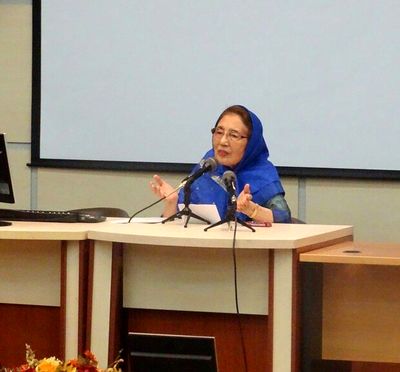Professor Okada, one of the first Japanese scholars to have received a Ph.D. in Persian Literature from the University of Tehran.
She traveled to Tehran in 2017 by an invitation of Iran's cultural attache in Japan to give a speech, meet with some Iranian personalities and also attend the International Book Fair. After returning to Japan she wrote down her memories of this trip in a book and thanked Iran's cultural attache in its introduction.
Okada has been doing research in Persian Literature and Iranian studies over the past 50 years. She has been enthusiastically working to introduce Persian classical literary works to Japan and has published translations of poetry collections such as Nizami and Khayyam. As an essayist, she was awarded the Japan Essayist Club Award in 1982 for "The Heart of the Iranians".
She has done her best in the dissemination of Persian culture, having translated the couplets of Persian poet Omar Khayyam from the original Persian.

The Japanese professor has been devoted to research and teaching students about the Persian language and its classical literature at the Tokyo University of Foreign Studies. She has also been enthusiastically working to introduce Persian classical literary works to Japan.
Okada was honored with a lifetime achievement award at the Silk Museum in the port city of Yokohama in 2010 during a ceremony held by the Embassy of Iran in Tokyo.
She also donated a large collection of her books about Iranian studies to Iran’s Cultural Office in Tokyo.
In a webinar held on October 20, by Iran’s Cultural Office in Tokyo to commemorate Persian poet Hafez, Okada called Iran the land of poetry and literature.
“Iranians are familiar with poetry and remember the poetry of their great masters, especially Hafez, and this is really praiseworthy.”
“When I was studying in Iran, the foreigners were not reciting poetry much but when I got to know the Iranians I found out that the elderly recite Persian poetry to their children and make use of the poetry by great masters during their special annual ceremonies, and this was a great and a very good experience for me,” she added.
“Reading and memorizing poetry is part of the daily life of Iranian people, something that I have never seen in other parts of the world, and if you travel to this country you will find this and feel it very well,” she noted.
Source: Meher News

